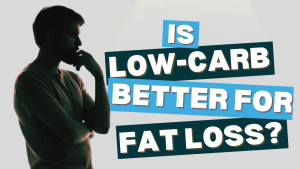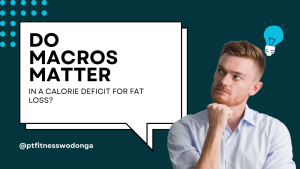Is Low-Carb Better for Fat Loss?
One of the most common questions we get from clients is:
"Do I need to go low-carb to lose weight?"
Let’s break down what really matters—and how low-carb diets might help, but aren’t always the magic bullet they seem to be.
It Starts With a Calorie Deficit
As we’ve mentioned before, the #1 rule for fat loss is a calorie deficit. That means you're eating fewer calories than your body burns.
But here’s the real secret: your ability to stick to that deficit—influenced by your macro and micronutrient choices—is what determines your success.
So, Why Do People Love Low-Carb Diets?
Low-carb diets get a lot of hype. One big reason is that people see fast results on the scale—but that initial weight loss isn’t all fat.
Carbohydrates are stored in the body along with water. For every gram of carbs stored, your body holds onto about three grams of water. So when you cut carbs, y drop water weight quickly.
That’s not fat loss—it’s fluid.
Weight Loss vs. Fat Loss
When people say they want to "lose weight," they usually mean lose fat.
Fat loss is slower and steadier—but it’s the meaningful, long-term goal.
Can You Cut Calories by Dropping Any Macro?
Yes! You can create a calorie deficit by cutting:
-
Protein
-
Carbs
-
Fats
-
Or by eliminating entire food groups (which usually removes a macronutrient).
But that doesn’t mean all options are equal in outcome.
Why We Recommend a Balanced Deficit
Rather than slashing just one macro, most clients see the best results when we cut calories evenly from both carbs and fats. Here’s why:
? Low Fat?
Too little fat = hormone issues.
You need fats to produce sex hormones, maintain mood, and feel strong.
? Low Carb?
Too little carb = performance drops.
Carbs are your body’s preferred fuel for exercise and brain function.
Tailor Your Approach to Your Goal
-
If gym performance is a priority: cut less from carbs and more from fat.
-
If general fat loss is the goal: a more balanced cut from both macros works best for most people.
Final Thought: Low-Carb Isn’t Necessary
Low-carb works for some.
But for most people, the best diet is one you can stick to—while maintaining energy, strength, and hormonal health.
Choose your macro split based on your goals, not just scale speed.
Do Macros Matter in a Calorie Deficit for Fat Loss?
One of the most common questions in the world of fat loss is: If I’m in a calorie deficit, do my macronutrients still matter?
It’s a great question—and the answer is a little more nuanced than just yes or no.
First, Let’s Talk Basics: The Calorie Deficit
At the core of any fat loss strategy is a calorie deficit. That means you're consuming fewer calories than your body needs to maintain its current weight. So technically, no—your macros don’t have to be perfect to lose fat. You could, in theory, eat nothing but ice cream every day, and as long as you stay in a calorie deficit, you’ll lose weight.
But here's the catch: how bad are you prepared to feel while doing it? And what kind of losses in performance, strength, energy, and general well-being are you willing to accept?
Why Macros (and Micros) Do Matter
Even though fat loss is dictated by calories in versus calories out, your macronutrient and micronutrient intake dramatically influences how you lose that weight—and how you feel while doing it.
Let’s break it down:
? Protein
-
Crucial for preserving muscle during a calorie deficit.
-
Without enough protein, you risk losing not just fat—but also muscle mass.
-
More muscle = better metabolism = better long-term results.
? Fats
-
Essential for hormonal health.
-
Going too low on fats can lead to serious hormonal imbalances and mood disturbances.
? Carbohydrates
-
Important for energy and training performance.
-
While carbs are a bit more flexible compared to protein and fat, slashing them too low can impact your workouts and overall energy.
? Micronutrients
-
Often overlooked, but vital.
-
Vitamins and minerals impact energy production, cognitive health, immune function, and more.
-
Poor food quality leads to poor micronutrient intake—and that can make dieting a miserable experience.
Food Quality & Hunger Management
Another key consideration is what you eat to reach that calorie deficit.
Let’s say you eat a Mars bar—it might set you back 300–400 calories. That’s a big chunk of your daily allowance if you’re trying to lose fat. Now imagine eating 300–400 calories of chicken breast and broccoli. That’s an entire meal.
Whole, nutrient-dense foods are generally more filling, satisfying, and easier to stick to in a diet. Ultra-processed foods might technically fit your macros, but they often leave you hungry and craving more.
So... Do Macros Matter?
If your goal is only to lose weight on the scale? Then no, macros don’t matter as much.
But if you want to:
-
Feel good during your fat loss phase
-
Preserve your muscle
-
Maintain your strength and energy
-
Protect your hormones
-
Avoid excessive hunger and cravings
Then yes—your macros, micros, and food choices absolutely do matter.
In summary:
Calories determine if you lose fat.
Macros and micros determine how well you lose fat.
Want to feel good, perform well, and actually enjoy the process? Don’t ignore your macros.


